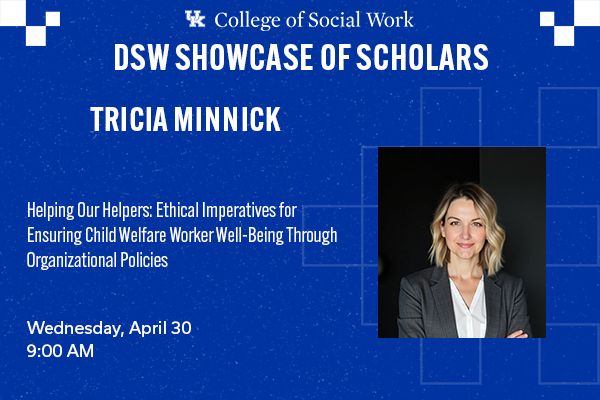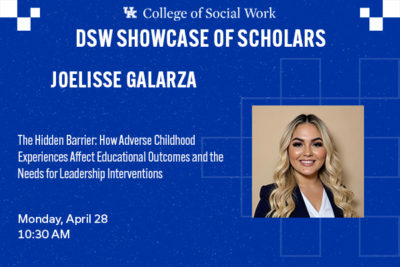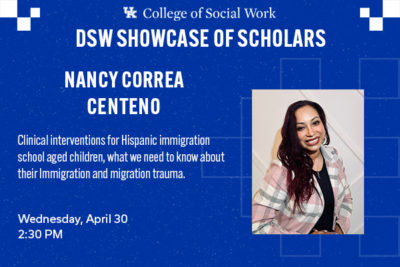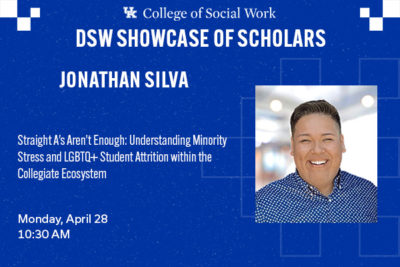DSW Candidate – Tricia Minnick, 9:00 AM – 10:15 AM
$0.00
Virtual Showcase of DSW Scholars 2025 Event!
Helping Our Helpers: Ethical Imperatives for Ensuring Child Welfare Worker Well-Being Through Organizational Policies
DSW Candidate – Tricia Minnick, LMSW
Wednesday, April 30, 2025
9:00 AM – 10:15 AM Eastern Time Zone
Credit Hours: 1.0 (ACE)
Description
Helping Our Helpers: Ethical Imperatives for Ensuring Child Welfare Worker Well-Being Through Organizational Policies
This capstone examines the critical issue of child welfare worker well-being and its implications for children and families. The presenter explores how social work leaders and organizations can better support their workforce and improve outcomes for children. The discussion focuses on three key work products.
The first product, a systematic literature review, centers on the role of organizations in promoting child welfare worker well-being. It highlights how the inherently challenging nature of this work contributes to secondary traumatic stress, burnout, and turnover. While research emphasizes the protective role of organizational culture and policies, it often neglects the ethical responsibilities of organizations to prioritize worker wellness.
The second product, a conceptual paper, proposes a new theoretical framework for ethical policy-making. By integrating Organizational Support Theory, Systems Theory, and Maslow’s Hierarchy of Needs, the framework asserts that organizations are ethically bound to prioritize worker well-being. The U.S. Surgeon General’s Framework for Workplace Mental Health and Well-Being (2024) and the NASW Standards for Social Work Practice in Child Welfare (2021) guide the discussion, advocating for consistent policies to address well-being disparities.
The third product, an application paper, introduces the Helping Our Helpers Organizational Wellness Policy Framework, a theory-driven tool for developing organizational policies. This framework aims to enhance worker well-being, reduce turnover, and improve outcomes for children and families.
Learning Objectives:
Upon completion of this conference, participants will be able to:
- Examine the impact of organizational support on child welfare workers’ well-being.
- Understand and apply a synthesis of theories into a new ethical framework for organizational responsibility.
- Be equipped with strategies for ethical wellness policy development.
Delivery Method: Live Interactive Training via Zoom Video Conferencing
Credit Hours: 1.0 (ACE)
Target Audience: This conference is intended for social workers and students.
Accreditation: University of Kentucky College of Social Work, Provider # 1377, is approved as an ACE provider to offer social work continuing education by the Association of Social Work Boards (ASWB) Approved Continuing Education (ACE) program. Regulatory boards are the final authority on courses accepted for continuing education credit. ACE provider approval period: 9/29/22-9/29/25. Social workers participating in this conference will receive up to 15 general continuing education credits.
Claiming CE Credit: Instructions for claiming CE credit will be disseminated at the beginning of each session.
Questions: If you have any questions regarding CE credit or to report a grievance, please contact Christina Krantz at Christina.Krantz@uky.edu. For technical assistance, please contact lmshelp@uky.edu.
Disclaimer: The views and opinions expressed in these presentations are those of the individual presenters and do not necessarily reflect the official policies or positions of the University of Kentucky or the College of Social Work. The inclusion of any topics, perspectives, or discussions is intended for academic engagement and does not constitute endorsement by the institution.



